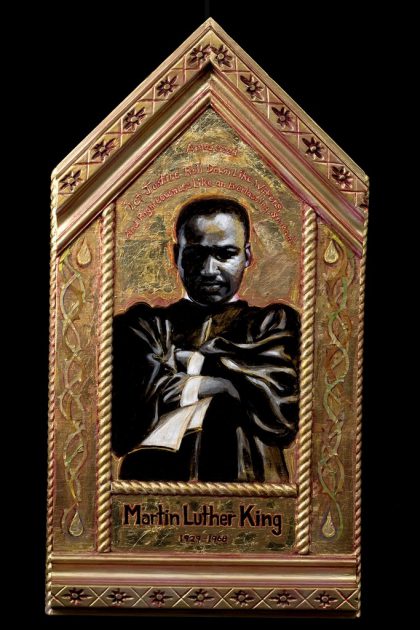The Rev. Dr. Martin Luther King, Jr. was one of the great figures of the modern era. His sermons and speeches stirred concern and sparked the conscience of the nation. The Civil Rights Movement he helped to create and the marches he led brought significant changes to the fabric of American life. His charismatic leadership inspired people of all ages and races, in this country and around the world, to work together to end segregation and dismantle racism.
Dr. King’s philosophy celebrated the worth of each person giving black and poor people a sense of dignity. His practice of non-violent direct action and affirmative social change galvanized the national consciousness toward the injustice of “Jim Crow” laws in the South and the mistreatment of minorities everywhere. His commitment to and his dream of a new way of life are now inextricably entwined with the American experience.
He was born on January 15, 1929 in Atlanta, Georgia. His father and grandfather were pastors of the Ebenezer Baptist Church where Martin Jr. became co-pastor with his father in 1959.He excelled in high school and entered Morehouse College at 16 years of age. In the fall of 1948, he began attending Crozer Theological School. It was here that he first became interested in Gandhi’s philosophy of non-violence. In 1955, he received a Ph.D. from Boston University School of Theology in Systematic Theology.While in Boston, he met Coretta Scott, a musician, and they were married in 1953.They were blessed with four children.
After earning his Ph.D., King became the pastor of the Dexter Ave. Baptist Church in Montgomery, Alabama. A few months later, on December 5th, Rosa Parks refused to comply with Montgomery’s segregation policies on buses. Residents launched a public transportation boycott and elected King the president of the newly formed Montgomery Improvement Association. The boycott last 382 days and the young pastor gained national prominence for his role in the campaign which resulted in the US Supreme Court ruling Alabama’s segregation laws unconstitutional.
Hoping to build on the success of Montgomery, King and other black pastors formed the Southern Christian Leadership Conference. King toured India in 1959 where he refined his understanding of Ghandian strategies of non-violence for social change. From this point on, King and SCLC were at the center of the movement for civil rights. In the spring of ’63, he led mass demonstrations in Birmingham, Alabama, where police turned dogs and water hoses on young people. King was arrested and wrote a “Letter from a Birmingham Jail” which cogently argued that the time to work for social change could no longer be delayed.In the summer of 1963, to a crowd of 250,000 protesters, he gave his “I Have a Dream” speech in front of the Lincoln Memorial. In 1964, he was awarded the Nobel Peace Prize.

